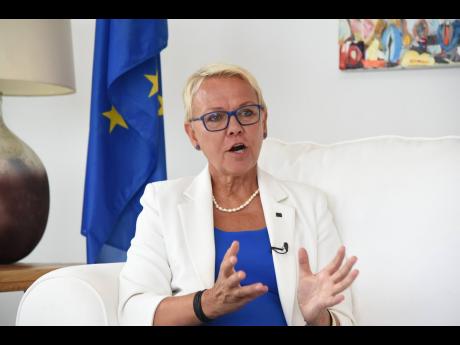EU to maintain assistance to Ja despite COVID hit
As the impact of the coronavirus (COVID-19) pandemic continues to strike at the heart of the global economy, a key source of grants to Jamaica has signalled that its funding of local projects will not be halted or reduced.
Malgorzata Wasilewska, outgoing head of the European Union (EU) Delegation to Jamaica, told The Gleaner in a recent interview that there are no plans to slash its budgetary and other support to developing countries like Jamaica .
“One of the strongest messages that we are getting is that allocations for not just the Caribbean, but Latin America, are not going to be reduced,” she said.
While acknowledging the economic difficulty that Europe itself is experiencing because of the pandemic, Wasilewska stressed that the EU would stand by its commitment to assist its developing partners.
“What it will mean, in terms of balance of region funds versus bilateral funds, it’s too early to say, but I do know that there is commitment to make the funding much more flexible,” she added.
The EU diplomat noted that Jamaica had made important gains prior to the onset of COVID-19.
“Given my experience of how well Jamaica was doing until COVID-19 came, it will be a prime candidate not only for funding, but also for top-ups if the partnership is going well,” she pointed out.
Under the European Development Fund, the EU has invested €66 million (approximately J$11 billion) in Jamaica since 2014 in the areas of justice, environment and climate change, public finance and citizen security.
And with the EU being the largest provider of grant resources to Jamaica, through its cooperation programme in support of Jamaica’s National Development Plan, Vision 2030, the EU ambassador said that the country’s plan would have to be readjusted.
“The whole world has to reset,” Wasilewska reasoned, adding that no one was prepared for the extent of the impact of the pandemic with a second wave of the highly contagious disease creating even greater uncertainty.
“I know the Government is already revising the Vision 2030. There is no doubt there will be setbacks,” she asserted.
Vision 2030 review under way
In May, Director General of the Planning Institute of Jamaica (PIOJ) Dr Wayne Henry signalled that the Government had started work to review and revise aspects of the Vision 2030 Jamaica plan, owing to the impact of COVID-19.
The ultimate objective of Vision 2030 Jamaica is for the island to achieve developed country status by the end of the next decade and, thereby, make it the place of choice to live, work, raise families and do business.
Henry said that the revision exercise would involve revisiting the targets up to 2030 and the schedule for achieving the planned outcomes and national development goals.
“This process has commenced with Government-led strategic actions and plans from various sectors, including programme revisions and reviews, in an effort to adapt to the challenges, shocks and risks presented by the global pandemic,” said Henry, according to the JIS.
Euromonitor International, an independent provider of strategic market research, reported that in the second quarter of 2020, the COVID-19 pandemic caused unprecedented declines in global economic activity due to lockdown and severe social-distancing measures.
Already, the International Monetary Fund (IMF) has projected a negative 4.9 per cent global growth in 2020. The Planning Institute of Jamaica has projected that the Jamaican economy would contract within the range of 4.0 and 6.0 per cent for fiscal year 2020-21.
In its June‘ World Economic Outlook Update, the IMF indicated that the adverse impact of the negative GDP growth for the year on low-income households is particularly acute, imperilling the significant progress made in reducing extreme poverty in the world since the 1990s.

